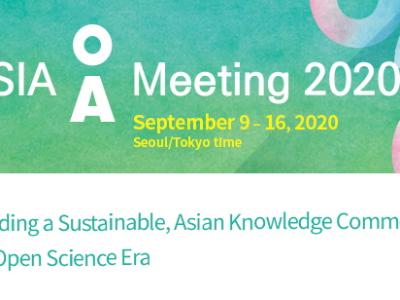-
172020. 09
No. 178 View. 215359
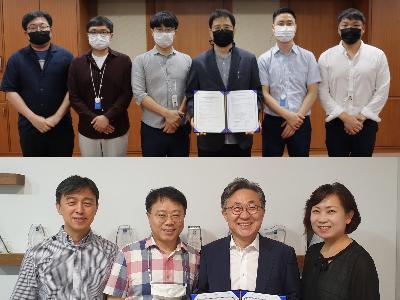
Technology Transfer of Visualization of Security Policy and Large Scale Log
Technology Transfer of Visualization of Security Policy and Large Scale Log KISTI has concluded technology transfer agreement with a private company, UNET System, on the system of visualization of firewall policy and log, named VizPolaris, that makes it possible to secure visibility of firewall policy and analyze invation log, on September 17th, 2020. The system converts text-based firewall-approaching policy and security log to visible images, which can help to intuitively recognize the policy and log. The system has been developed to help more efficiently operate and manage the firewall by managing firewall policy efficiently; deeply tracking IP behaving maliciously; effeciently detecting cyber target attack based on social issues; and providing information on abnormal behavior. The visualization system has functions that recognize and improve both overlapping policies vulnerable to sercurity or unnecessary and problems having strange relations between approaching policies by expressing firewall's approach policies hierarchically. It also helps to identify and handle the first communiation time with malicious IP; major attack behaviors; related social issues; and targeted objects by creating, accumulating, and visualizing various statistical information of massive security logs. In addition, it makes it possible to intuitively indentify malicious hebaviors of invaders or victims by expressing periodic or aperiodic features of network traffics through collecting and analyzing security logs for a long time. The developed technology is expected to make a great contribution to enhancement of security of organizations and companies by supporting swift decising-making and detection and handling of cyber attack of ordinary managers as well as security exeives through securing not only firwall's logs essentially installed and operated by each organization and cyber security center but also visibility of security policy. -
252020. 08
-
222020. 05
No. 176 View. 95317
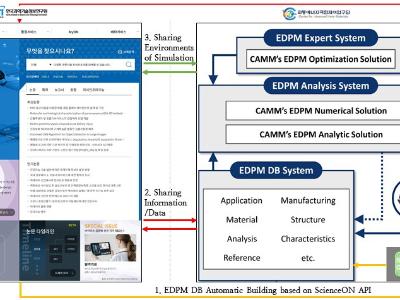
KISTI & KIMM building R&D supporting environments for metastructure researchers
KISTI & KIMM building R&D supporting environments for metastructure researchers - KISTI's ScienceON to support sharing and utilization of research resources - < ScienceON-EDPM Linkage Diagram > KISTI's ScienceON is determined to be connected with EDPM, Engineering Design Platform for Metastructures, being conducted by CAMM, Center for Advanced Meta-Materials, of Korea Institute of Machinery & Materials(KIMM), for supporting R&D of metastructure researchers. ScienceON is a research platform for connecting and utilizing S&T information, the national R&D information, research data, data analysis systems, and supercomputing resources. EDPM is also a research platform providing experimental analysis and simulation of metastructures. Once both of the services are connected, after metastructure researchers search papers of the field; automatically extract the structures from the papers; and make them data on ScienceON, they can analyze experiments and simulate on EDPM. In addition, metastructure R&D information built on EDPM can be provided on ScienceON as well, which is expected to help to drastically enhance R&D efficiency of researchers. -
062020. 05
No. 175 View. 103149
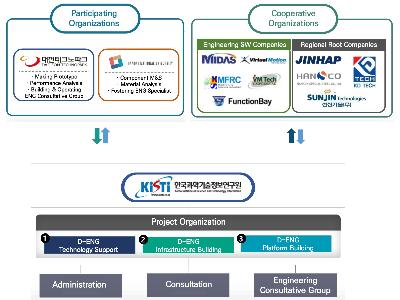
KISTI selected for the Root Industry supporting work using digital engineering t...
KISTI selected for the Root Industry supporting work using digital engineering technology - Investing 9 Billion Won for 3 Years from 2021 - KISTI is selected as the supervising organization for the advancement of innovation of the Root Industry in Daejeon Metropolitan City based on digital engineering, which is one of the supporting works for the regional base organizations of the Ministry of Trade, Industry and Energy of the South Korean Government. In Korea the Root Industry refers to a type of business utilizing the process technologies such as casting, mold, plastic processing, welding, surface treatment, and heat treatment. KISTI with Daejeon City plans to support building equipment of digital engineering and performance analysis; simulation technology of process and components; demand and supply-connected platform; and fostering labor force of engineering, through 9 billion won(approximately 7.3 million US dollars) including 6 billion of the government expenditure for 3 years from 2021. The Supercomputing Modeling & Simulation Center of KISTI, supervising the work, is the only one M&S-based business-supporting center of the government-funded research institutes. It has been providing innovative performance advancement of process and components of about 600 domestic manufacturing businesses since 2007. Based on the professionality from the experience, it will help innovative advancement of the Root enterprises in Daejeon by utilizing digital engineering technology with Daejeon Techno Park and Hanbat National University, which are also participating organizations of the work. KISTI plans to raise the rate of application of digital engineering up to 20%, which is just 4% at present, and improve productivity by 30% by supporting 105 Root businesses in Daejeon. -
232020. 04
No. 174 View. 91022
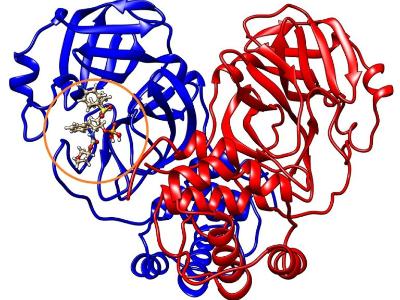
National Supercomputing Center in Korea, KISTI, Joins Fight Against COVID-19
National Supercomputing Center in Korea, KISTI, Joins Fight Against COVID-19 A research team in Korea Institute of Science and Technology Information (KISTI) have utilized the KISTI-5 called Nurion, the world 14th fastest supercomputer, to identify 43 drug candidates. These drugs’ efficacy against COVID-19 needs further experimental verification, and the preliminary results have been published on ChemRxiv. COVID-19 was first identified in the Chinese city of Wuhan and has since spread around the world, quickly becoming a major global pandemic. Many research institutes and pharmaceutical companies across the globe have promptly responded to develop vaccines and treatments as a counteraction to the rapid spread of COVID-19. For example, researchers at the Department of Energy’s Oak Ridge National Laboratory (ORNL) were quick to react against COVID-19. They used its own supercomputer, Summit, the world’s fastest supercomputer, to carry out research exploring inhibitor candidates that could possibly inhibit activity of “spike” proteins on the envelop of the novel coronavirus. Researchers in KISTI have used its own supercomputer, Nurion, to find drug candidates potentially usable as a cure for COVID-19 amongst 19,168 drug molecules from SWEELEAD library and ChEMBL database. Using the 3D structure of main protease (Mpro) of the novel coronavirus discovered by Germany researchers which is known as an essential enzyme used in the cloning of the novel coronavirus inside the host cell, KISTI researchers evaluated binding affinity between Mpro and the 19,168 compounds, and ranked these compounds based on the molecular docking score. After selecting 43 candidates, they conducted a molecular dynamics (MD) simulation to further investigate protein-drug interaction. Finally, 8 drug candidates were narrowed down and selected. “Leveraging the power of supercomputer is a key to in-silico screening through tens of thousands of chemical compounds within days, which would, otherwise, take months using PC,” said Sangjae Seo, a KISTI researcher who has led this study. “We plan to collaborate with Korea Institute of Chemical Technology (KRICT) and Seoul National University (SNU) to further assess the effectiveness of the selected drug candidates at the cellular and enzymatic level and will refine more extended drug discovery pipeline by adding in-vitro and in-vivo steps as well as AI-driven in-silico screening approaches,” added Soonwook Hwang, director of KISTI supercomputing center. Keeping COVID-19 under control is a nation’s top priority, and KISTI, as a government-funded research institute, has a responsibility to take prompt measures in responding to this current national and global epidemic. To this end, KISTI has recently announced a call for project to which any Korean scientists, who want to join the combat against COVID-19, could a proposal for willing to tap into the KISTI-5 supercomputing resources in order to be able to be armed with better tools for their own fight. “This contingency call is exceptional in a sense that as opposed to a routine call requiring relatively long and time-consuming review process that occurs three times a year, nearly all applications will likely be accepted and approved with no special review process, once the application is proved to have a strong relevance to the fight against COVID-19. This program will be in operation tentatively for about up to six months”, said Hee-yoon Choi, president of KISTI. The image illustrates how a candidate drug, located inside the orange circle, binds to the main protease (Mpro) of the novel coronavirus in blue and red. -
172020. 04
No. 173 View. 87299
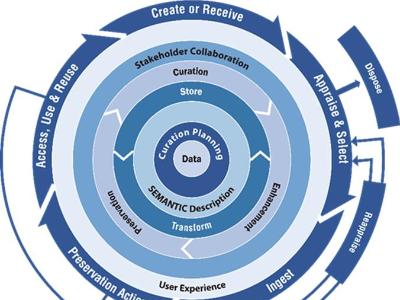
Improving KISTI infrastructure and curation practice to promote open access to s...
Improving KISTI infrastructure and curation practice to promote open access to scientific and technological information KISTI, Korea Open Access Platform “KOAR” Open KISTI(Korea Institute of Science and Technology Information) has launched KOAR(Korea Open Access platform for Researchers, https://koar.kr), a platform to help Korean researchers access, publish, self-archive, and monitor open access articles, on February 27, 2020. KOAR will enhance the information accessibility and play a role of the national repository. Researchers can access over 21 million open access articles collected from all over the world through KOAR. KOAR holds 194,138 open access articles from national R&D projects. It also has over 1,000 Korean open/free access journals. KOAR runs a repository to self-archive open access content for researchers and learned societies, and provides SAFE(https://safe.koar.kr), a system to help researchers avoid predatory journals and conferences. Currently, KOAR has only Korean version; however, it plans to provide its website in English by the end of 2020 so that international researchers can search and access Korean open access articles. Constructing High-Quality Content Based on KISTI Curation Lifecycle Model KISTI holds and provides Korea's largest scientific and technological content. Since 2018, KISTI has developed and upgraded the KISTI curation lifecycle model to conduct systematically and efficiently KISTI’s content curation practices. The KISTI curation lifecycle model adapted UK’s Digital Curation Center(DCC) curation lifecycle model that has influenced many lifecycle models around the world since 2008. The DCC reviewed the KISTI model and acknowledged its excellence. Particularly, it appreciates that the KISTI model has “User Experience” and “Stakeholder Collaboration.” Based on KISTI model, KISTI enhanced curation application rate by identifying references, authors, institutions, DOIs, and funding. The KISTI model, the implementation strategies, and identification activities can be adopted to construct high-quality scientific and technological infrastructure at the national level. Moreover, they are expected to be adopted by many libraries and information centers. -
142020. 04
No. 172 View. 100163
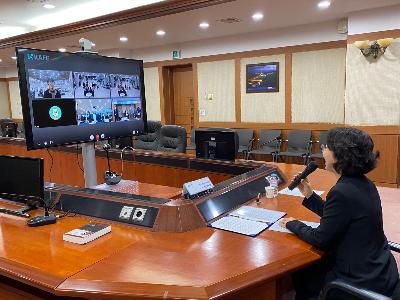
KISTI to Cooperate Big Data & AI R&D with National Assembly Library
KISTI to Cooperate Big Data & AI R&D with National Assembly Library - They Conclude MOU for Cooperation of R&D of Big Data and AI - KISTI and the National Assembly Library(NAL) have concluded MOU for cooperative R&D of Big Data and AI on April 14th, 2020. This MOU has been concluded through KISTI's video conference platform Webinar owing to the social distancing, which is the government's guideline for preventing spread of COVID-19. In order to support and invigorate the AI industry, KISTI through this MOU will prepare the second stage of curation system for science and technology contents by building of machine learning data; preprocessing of prior learning data; development of technology for curation of data processing; and pushing forward with developing quality of data. The second stage of curation system for science and technology contents refers to building of environments for data curation of abundant S&T contents that the artificial intelligence is capable of utilizing such as about 100 million papers, 26 million research reports, and 136 million S&T researchers, at home and abroad, which have been secured through KISTI's distinct missions granted from the government. This MOU will accelerate joint applications of both digital information and information technology infrastructure that the organizations have accumulated and possessed, which is expected to contribute to making ecosystem of creative cooperation satisfying the national and social needs. -
142020. 04
No. 171 View. 114577
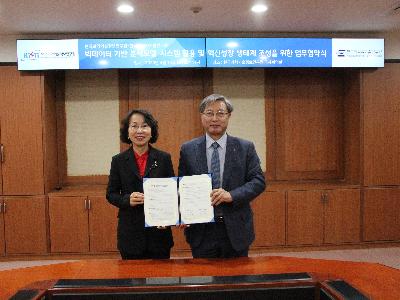
KISTI and KIER to Commercialize Public Technology of Energy Together
KISTI and KIER to Commercialize Public Technology of Energy Together - KISTI to Transfer Smart K2C to KIER - KISTI and KIER, Korea Institute of Energy Research, agree with mutual cooperation on April 14th, 2020, for making ecosystem for innovative development of energy enterprises by using KISTI's Smart K2C, the big data based analysis model and system. KISTI customizes Smart K2C in accordance with features of the targeting organization to maximize the system's uptake further when it transfers the analysis model and system. For this transferring to KIER, KISTI not only built database of technology and market in the field of the energy industry, at home and abroad, but developed a detailed model inside the system for supporting customized analysis of the energy field. KISTI expects to raise the success rate of commercialization of the domestic public research outcomes from the transferring of Smart K2C to public organizations such as KIER. Smart K2C helps to analyze big data with ease, and it also suggests specific solutions that a company generates revenue in the market based on the result of analysis. Thus, easier commercialization of technology-based products could cause increase of sales of enterprises, and Smart K2C is expected to play a key role to raise the success rate. From now on, Smart K2C will be utilized on supporting enterprises of the energy industry and discovering promising technologies that use KIER's technologies, researchers, equipment, and so on. -
012020. 04
No. 170 View. 87253

KISTI to host International Data Week 2021
KISTI to host International Data Week 2021 For Social Contribution to Sharing and Utilizing Research Data KISTI will hold International Data Week 2021, a conference for share and utilization of research data. IDW 2021 is co-hosted with international organizations of research data such as CODATA, RDA, and WDS. The ecosystem of data innovation to encourage social contribution with new scientific discoveries and innovation will be discussed since research paradigm has recently changed into data-centered research with open data and its utilization. International Data Week was held twice: in Denver, U.S.A., in 2016 and in Gaborone, Botswana, in 2018. In addition, the 18th RDA Plenary Meeting and SciDataCon 2021 will be hosted from November 8th to 11th, 2021, with IDW 2021. You can check the information of IDW 2021 here as well: - CODATA: https://codata.org/save-the-date-international-data-week-2021-8-11-november-2021-seoul-south-korea/ - RDA: https://www.rd-alliance.org/save-date-international-data-week-2021-8%E2%80%9311-november-2021-seoul-south-korea -
242020. 03
No. 169 View. 88688
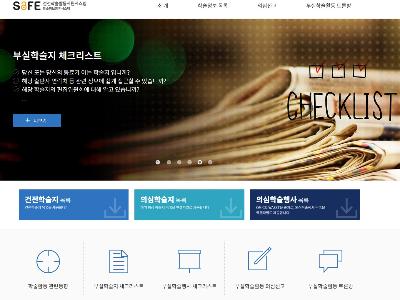
KISTI Opens Beta System against Fake Academic Publishing
KISTI Opens Beta System against Fake Academic Publishing “It is advised for researchers to solve the problem of bogus society and publication all together” KISTI trying to build sound academic publication ecosystem through sharing of doubtful academic information KISTI has announced that it has started a beta system called SAFE, Scholarly ecosystem Against Fake publishing Environment, both to confirm, share, and prevent academic information suspicious as bogus, and to provide safe academic publication. Since 2018, negative cognition joining bogus society or submitting their papers to bogus academic publication has spread. However, it is pointed out that researchers cannot find and confirm whether some society or publication is bogus or not, one by one. SAFE has reflected those cruces, which are ambiguity to judge and difficulty to verify. Thus, it introduces concept, characteristic, guideline, trend, and etc. of bogus society. It also has information about more than 150 thousand academic journals and more than 480 thousand academic meetings suspicious as bogus. There are three key functions. One is searching; another is reporting; and the other is discussing, which helps researchers to make a more exact decision to figure predatory society out. It is planned that SAFE will launch official service in October this year. Therefore, it expands database about fake academic publications and meetings. It is also planned that SAFE will provide the safe index of academic information; develop technology to detect and distinguish doubtful academic activities ; and provide OpenAPI in order for each university and government-funded research institute to develop their own service. * This system provides the functions mentioned above only in Korean.

 Delete Article!
Delete Article!